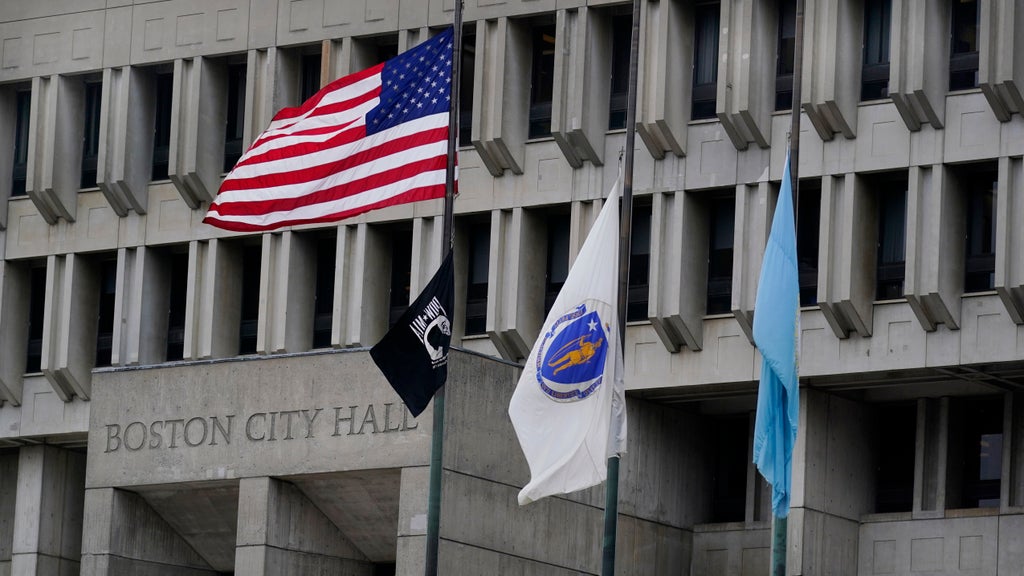
In a unanimous ruling, the US Supreme Court determined that the city of Boston violated the First Amendment rights of a conservative group by refusing to let its “Christian flag” briefly fly outside City Hall while allowing other groups to fly flags of their own.
For several years, the city allowed groups to fly their flags – from flags representing LGBT+ Pride and Boston’s health workers to flags from other countries to recognise their national holidays – on one of three flag poles outside City Hall, alongside the Massachusetts state flag and American flag.
But in 2017, the city denied a request for a flag-raising ceremony for a “Christian flag” from Camp Constitution, a volunteer group described as seeking to “enhance understanding of the country’s Judeo-Christian moral heritage”.
The city rejected the request over concerns that it would be perceived as unconstitutional government speech endorsing a particular religion. The organisation’s director Hal Shurtleff challenged the rejection, lost in lower courts and landed an appeal before the nation’s high court.
The Supreme Court’s opinion, written by Justice Stephen Breyer, who is retiring this term, argued that “Boston did not make the raising and flying of private groups’ flags a form of government speech” when allowing those groups to fly their own.
On its website and social media channels, writers for Camp Christian – represented by evangelical Christian legal group Liberty Counsel – also espouse views against Covid-19 vaccines, allege that the attack on the US Capitol was a coverup for “massive” voter fraud in the 2020 presidential election, and claim that the Pearl Harbor and September 11 attacks were “carefully orchestrated false flags”.
In 2017, Camp Constitution sought a permit to “raise the Christian flag on Boston City Hall flagpoles to commemorate Constitution Day and Citizenship Day” as well as the “civic and cultural contributions of the Christian community to the City of Boston, the Commonwealth of Massachusetts, religious tolerance, the Rule of Law and the US Constitution,” according to the group.
Supreme Court justices determined that the city’s relative lack of participation in selecting or curating those flags does not express government speech but essentially provided a public platform for protected free speech in which religious messages can be shared.
“All told, while the historical practice of flag flying at government buildings favors Boston, the city’s lack of meaningful involvement in the selection of flags or the crafting of their messages leads us to classify the flag raisings as private, not government, speech,” Justice Breyer wrote.
Justice Breyer noted that the city rejected the request “solely because the Christian flag he asked to raise ‘promotes a specific religion,’” which would be a form of discrimination, though he also noted that “nothing prevents Boston from changing its policies going forward” to allow only certain types of flags to fly outside City Hall.
“This decision rightly reaffirms well-established principles regarding viewpoint discrimination in forums that have been opened to the public for private expression,” according to a statement from ACLU of Massachusetts executive director Carol Rose.
“Governments remain free to retain control of their flag poles and express views there that they conclude – with input from those they represent – are in the best interest of the local community and avoid concerns about establishment of religion,” she said.
Three conservative justices in their concurring opinions, however, signalled their willingness to strip protections against government-imposed religious speech altogether.
Justice Samuel Alito, joined by Justices Clarence Thomas and Neil Gorsuch, suggested getting rid of these kinds of speech tests and instead ask “whether the government is speaking instead of regulating private expression”.
A ruling in this relatively straight-forward speech case follows last week’s opening arguments in Kennedy v Bremerton School District, which involves a public high school football coach’s 50-yard-line prayers with players at the immediate conclusion of games.
The school district repeatedly asked Joe Kennedy to move his prayer to somewhere less conspicuous, as to avoid the appearance of the school’s endorsement of a religious view. A ruling in his case against the district – represented by a prominent conservative legal group – could have far-reaching consequences beyond the football field and potentially shrink core First Amendment protections that prevent government bodies from imposing religious views.
Rachel Laser, president of Americans United for Separation of Church and State, which is representing the school district in that case, said the Boston case could “undermine church-state separation if it is abused in ways that end up favoring the dominant religious majority.”
“But governments might avoid that by closing the forum at any time, as the court noted,” she said in a statement. “Additionally, the flags flying above city hall would have been government speech if Boston had stated so in a policy or exercised more discretion in deciding which flags to display. Other governments might take that path.”







